
Cuisine
Brazilian cuisine
Brazilian cuisine is known for its bold flavors, use of fresh ingredients, and diverse regional specialties. The cuisine is heavily influenced by the country's history of colonization and immigration, resulting in a fusion of flavors and techniques. Brazilian cuisine is also known for its use of churrasco, a style of barbecue that involves slow-roasting meat over an open flame.
Typical ingredients
Black beans, Rice, Cassava, Coconut milk, Palm oil, Churrasco (barbecued meat), Feijoada (a stew made with black beans and pork), Farofa (toasted cassava flour), Pão de queijo (cheese bread), Açaí berries, Guaraná
Presentation and garnishing
Brazilian cuisine is often presented in a colorful and vibrant manner, with dishes featuring a variety of textures and flavors. Garnishes such as fresh herbs, sliced fruit, and toasted nuts are often used to add visual interest to dishes. Feijoada, a traditional Brazilian stew, is often served with rice, farofa, and orange slices.
Brazil is the largest producer of coffee in the world, and coffee is an important part of Brazilian culture. The country is also known for its production of cachaça, a distilled spirit made from sugarcane juice that is used in many traditional cocktails.
More cuisines from this region...
Argentinian cuisine, Colombian cuisine, Peruvian cuisine, Venezuelan cuisine, Chilean cuisine, Bolivian cuisine, Ecuadorian cuisine, Paraguayan cuisine, Surinamese cuisine, Uruguayan cuisine
History
Brazilian cuisine has a rich history that dates back to the indigenous tribes that inhabited the region before colonization. The cuisine was heavily influenced by Portuguese colonization, which brought ingredients such as wheat, sugar, and dairy to the region. African slaves also played a significant role in shaping Brazilian cuisine, introducing ingredients such as palm oil, okra, and coconut milk. Today, Brazilian cuisine is a fusion of these influences, resulting in a diverse and flavorful cuisine.
Cultural significance
Brazilian cuisine is an important part of the country's cultural identity, with many regional specialties and traditional dishes. The cuisine is also heavily influenced by the country's history of colonization and immigration, making it a fusion of flavors and techniques. Brazilian cuisine is often associated with churrasco, a style of barbecue that is popular throughout the country.
Health benefits and considerations
Brazilian cuisine is known for its use of fresh ingredients and bold flavors. Many traditional dishes are high in protein and fiber, making them a healthy choice. However, some dishes can be high in fat and calories, so it is important to enjoy them in moderation. Brazilian cuisine is also known for its use of tropical fruits and vegetables, which are rich in vitamins and minerals.
Brazilian cuisine dishes Browse all »
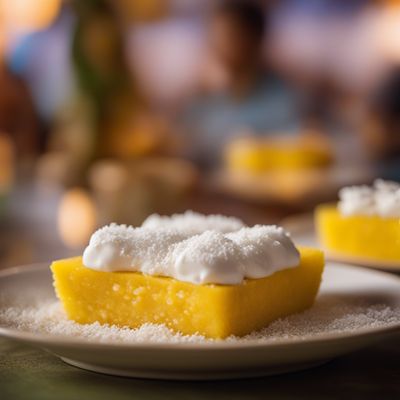
Acaçá
Acaçá is a traditional Brazilian sweet and creamy dish made with cornmeal and coconut milk. It is often served as a dessert or snack.

Brigadeiro
Brigadeiro is a traditional Brazilian sweet that is loved by many. It is a chocolate truffle that is made with condensed milk and cocoa powder. It is a simple and easy-to-make...

Picanha
Picanha (beef dish)
Picanha is a popular Brazilian cut of beef that is known for its tenderness and rich flavor.
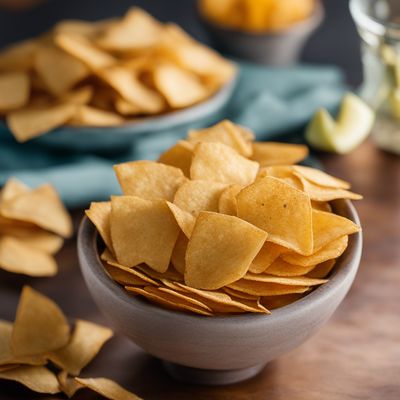
Spiced Yucca Chips
Spiced Yucca Chips are a delicious and healthy snack that can be enjoyed any time of day. Made from fresh yucca root, these chips are seasoned with a blend of spices that give...
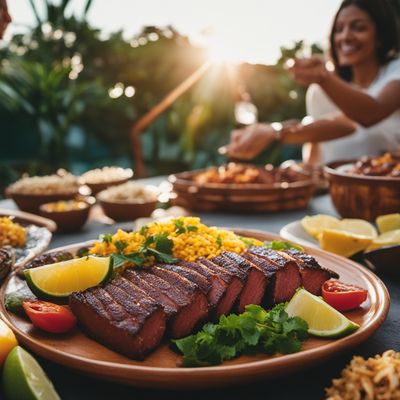
Carne de sol
Carne de sol is a traditional Brazilian dish that consists of sun-dried beef that is seasoned with salt and grilled to perfection. It is a flavorful and tender dish that is...

Fraldinha
Fraldinha (beef dish)
Fraldinha is a flavorful and tender cut of beef that is popular in Brazil and other parts of South America.

Créme de papaya
Creme de papaya
Créme de papaya is a Brazilian dessert made from papaya and vanilla ice cream. It is a refreshing and light dessert that is perfect for hot summer days.
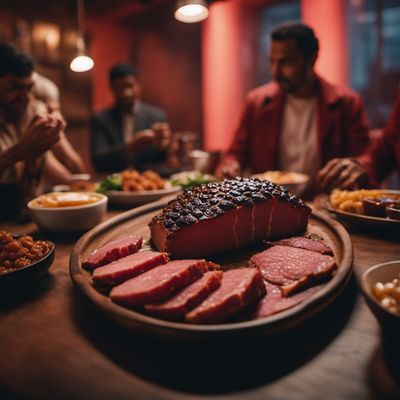
Carne de onça
Jaguar Meat
Carne de onça is a traditional Brazilian dish made with raw beef and spices. It is typically served as an appetizer or snack and is a favorite among meat lovers.
Brazilian cuisine recipes Browse all »

Brazilian Chicken and Rice Soup
Soul-Warming Brazilian Chicken and Rice Soup
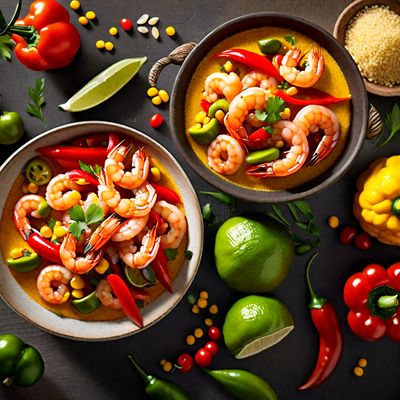
Brazilian-inspired Tapas
Samba Tapas Fiesta

Bolo de Rolo with a Twist
Delightful Spiraled Cake: A Modern Twist on Bolo de Rolo
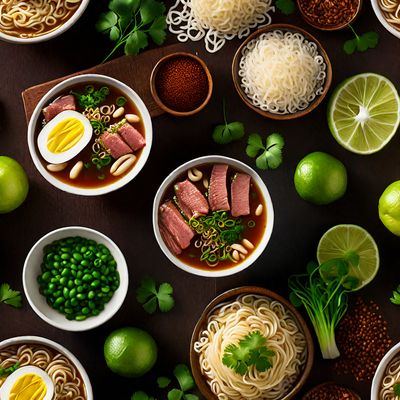
Brazilian-style Ramen
Feijoada Ramen: A Fusion of Japanese and Brazilian Flavors
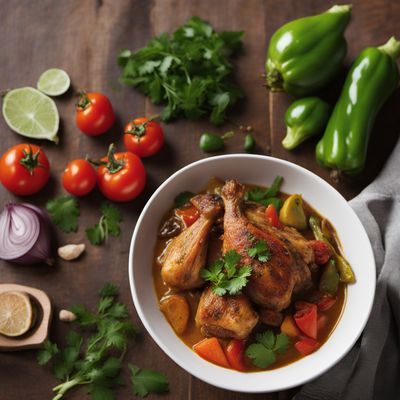
Cabeça de Galo Stew
Brazilian Delight: Hearty Cabeça de Galo Stew

Brazilian Cheese Bread
Savory Delights: Brazilian Cheese Bread Recipe
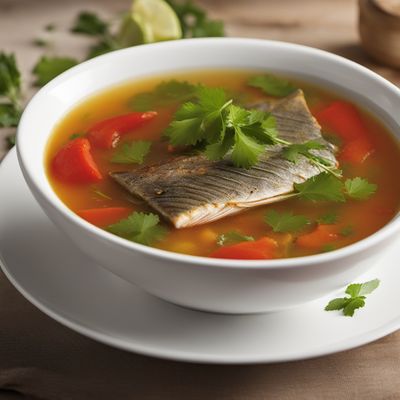
Caldo de Piranha - Brazilian Fish Soup
Amazonian Delight: A Flavorful Journey with Caldo de Piranha

Brisas do Lis - Brazilian Coconut Shrimp Stew
Tropical Delight: Brazilian Coconut Shrimp Stew
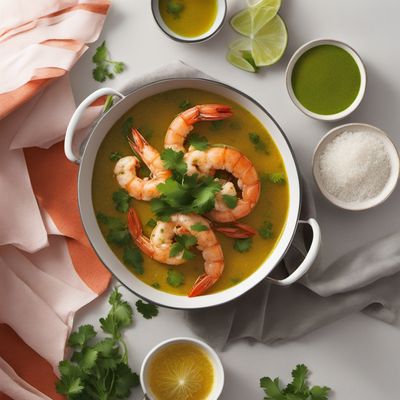
Rebocado de Camarão (Shrimp Rebocado)
Savor the Flavors of Brazil with Shrimp Rebocado

Patas de Veado - Brazilian Slow-Cooked Venison Shanks
Tender and Flavorful: Brazilian Slow-Cooked Venison Shanks

Tacos al Pastor with a Brazilian Twist
Brazilian-inspired Tacos al Pastor: A Flavorful Fusion

Brazilian-style Creamy Risotto with Arugula
Arugula Delight: Creamy Brazilian Risotto with a Twist